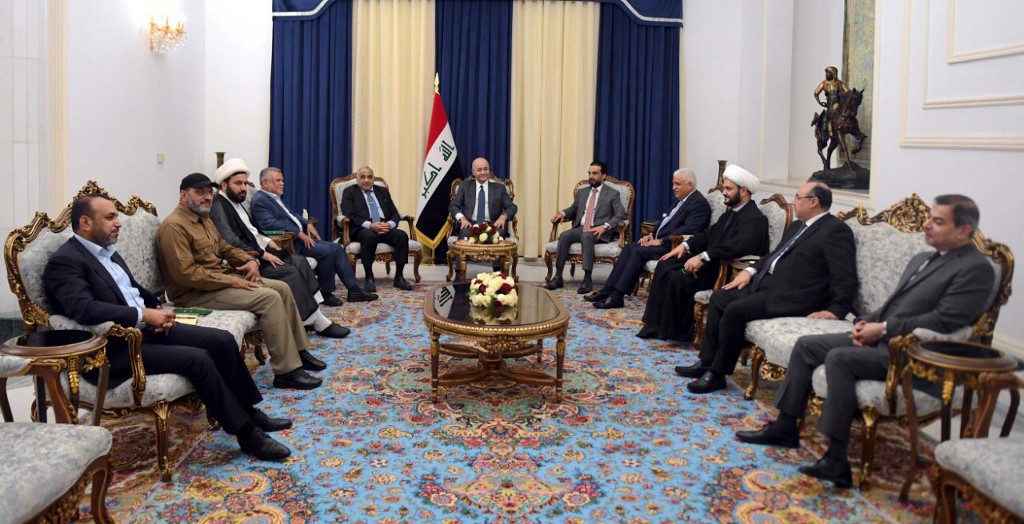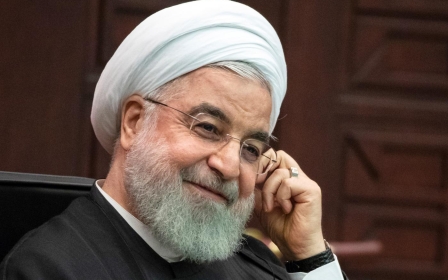Iraq embassy protest: Trump has been drawn into a battle he can't win

On Tuesday, Iraqi demonstrators stormed the US embassy in Baghdad’s Green Zone to protest US air raids that killed 25 members of Kataib Hezbollah, an Iraqi militia that is part of the Popular Mobilisation Units (PMU).
While the PMU ordered protesters to leave the next day, the brazen nature of the breach of the heavily fortified diplomatic compound sent a message to Washington. Firstly, while the Trump administration may be able to attack PMU-affiliated bases from the air, it is the PMU that controls politics on the ground in Iraq.
Secondly, up until the US raid, the ire of Iraq’s protesters had been focused on the corruption of Iraq’s political elite and how Iran supported and protected the incumbent government. The US decision to attack the PMU offered a lifeline to Iran-affiliated militias and the Islamic Republic, shifting Iraqi demonstrators’ anger from corruption to violations of national sovereignty.
Storming the Green Zone
As the region enters a new decade, the events of the last few days demonstrate how the US continues to misunderstand the ramifications of its actions in the Middle East, and how its influence is waning.
New MEE newsletter: Jerusalem Dispatch
Sign up to get the latest insights and analysis on Israel-Palestine, alongside Turkey Unpacked and other MEE newsletters
Recent events gave Iran and the PMU an opportunity to shift the narrative of the protest movement away from them and towards the US
This week’s protests were not the first time the Green Zone was stormed by Iraqi demonstrators. In 2016, the followers of Iraqi cleric Muqtada al-Sadr, in a coalition with Iraq’s leftists, led a movement to protest issues that still animate Iraqis who took to the streets in 2019: corruption, lack of services and unemployment.
In late April 2016, in a demonstration of the seriousness of his demands, Sadr’s followers stormed the Green Zone, taking their sit-in to parliament itself, with some ransacking the offices of politicians. Protesters withdrew after making their point. Their actions were symptomatic of a desire among Iraq’s civil society and public for reform of the Iraqi state.
A similar event transpired this week, as protesters stormed a symbolic institution in the Green Zone to make a point not about corruption per se, but about the US violation of Iraq’s sovereignty. Recent events gave Iran and the PMU an opportunity to shift the narrative of the protest movement away from them and towards the US.
Violating Iraq's sovereignty
Over the summer of 2019, Israel carried out a series of air strikes on PMU bases in Iraq. Unlike previous attacks, when it has sought plausible deniability after an air strike or assassination, Israel did not deny its role.
Iran, the Iraqi government and the PMU remained relatively quiet immediately after the Israeli attacks. So why did Iran and its allied militias fail to retaliate after the Israeli strike, but did so after the US one?
Pro-Iranian militias within the PMU were most likely instructed not to retaliate after the Israeli attacks for fear of escalating tensions. Since 2017, Israel has targeted Iranian and affiliated militias’ weapons depots and convoys in Syria with more than 200 air strikes.
Iran and its allied militias in Iraq, as well as the Iraqi government, knew that if they retaliated, it would set off a spiral of violence with Israel. Tehran and the militias realised they had to bear the brunt of the attacks, and belatedly issued mere rhetorical condemnation.
On the other hand, the recent US attacks offered Iran and its allied Iraqi militias an opportunity to enhance their power. Not only did the air raids shift popular Iraqi ire from Iran to the US, but the sacking of the US embassy only resulted in President Donald Trump announcing that 750 troops would be sent to the Middle East, the same type of symbolic gesture he made after the attacks on Saudi Arabia’s oil infrastructure last September.
The most recent events have undermined Trump’s promise to withdraw from US commitments in the Middle East. They also raise the question: how did the Trump administration find itself in this quandary in the first place?
The Iran nuclear deal
In a May 2018 piece for MEE, I argued that Trump’s decision to pull out of the 2015 Iran nuclear deal would result in the Islamic Republic retaliating by manipulating even further Iraq’s domestic politics, undermining US influence there. Throughout 2019, Tehran’s machinations had been the target of Iraqi protesters’ frustrations.
The US air raids were a response to an attack attributed to one of Iraq’s militias that killed a US contractor. But the attack that killed this contractor was an Iranian response to economic sanctions that the Trump administration imposed on Iran after Washington withdrew from the nuclear deal.
Since then, Iran has launched a low-intensity war against the US and its allies in the region, culminating in the death of the contractor, the subsequent US retaliation, and the sacking of its embassy.
Now, as the US officially enters an election year, Iran and its militias have forced Trump to take military action.
By sending more troops to the region, Trump has undermined the election promises he made before entering office in 2016 of withdrawing the US from endless entanglements. Sending a further 750 troops will do little to deter Iran or its allies.
As the region enters a new decade, Iran’s latest gambit is another demonstration of eroding US power in the region.
The views expressed in this article belong to the author and do not necessarily reflect the editorial policy of Middle East Eye.
Middle East Eye delivers independent and unrivalled coverage and analysis of the Middle East, North Africa and beyond. To learn more about republishing this content and the associated fees, please fill out this form. More about MEE can be found here.







